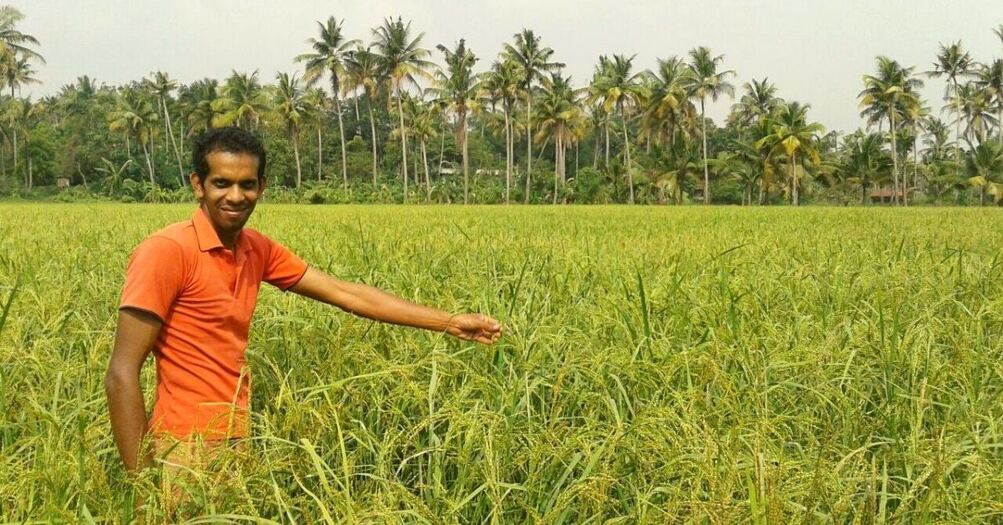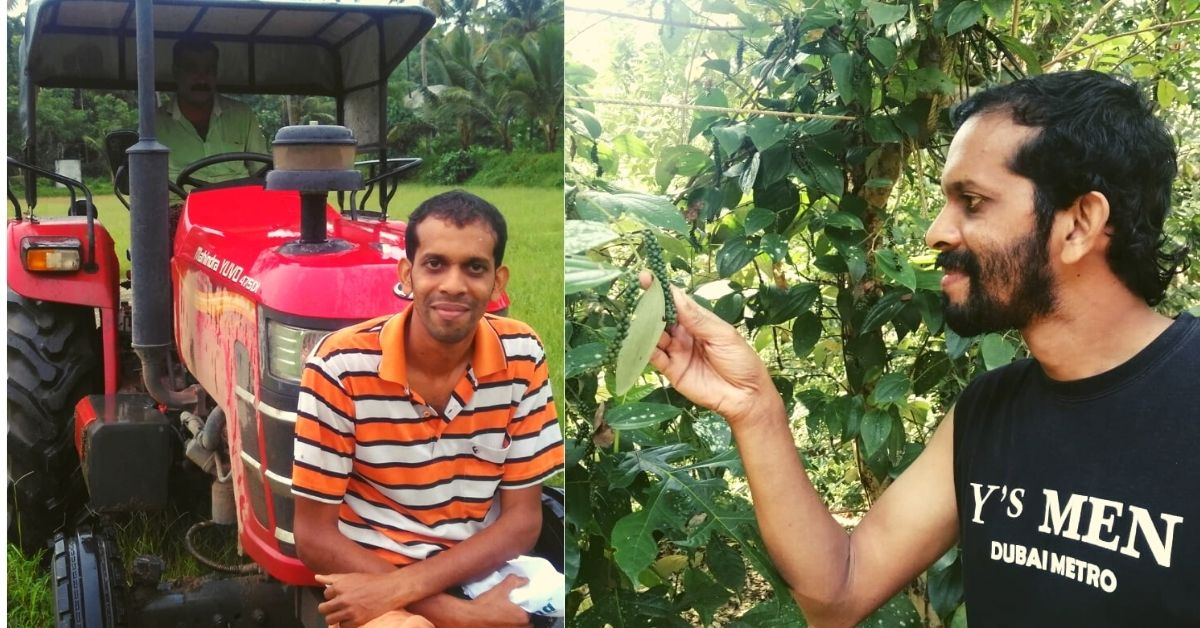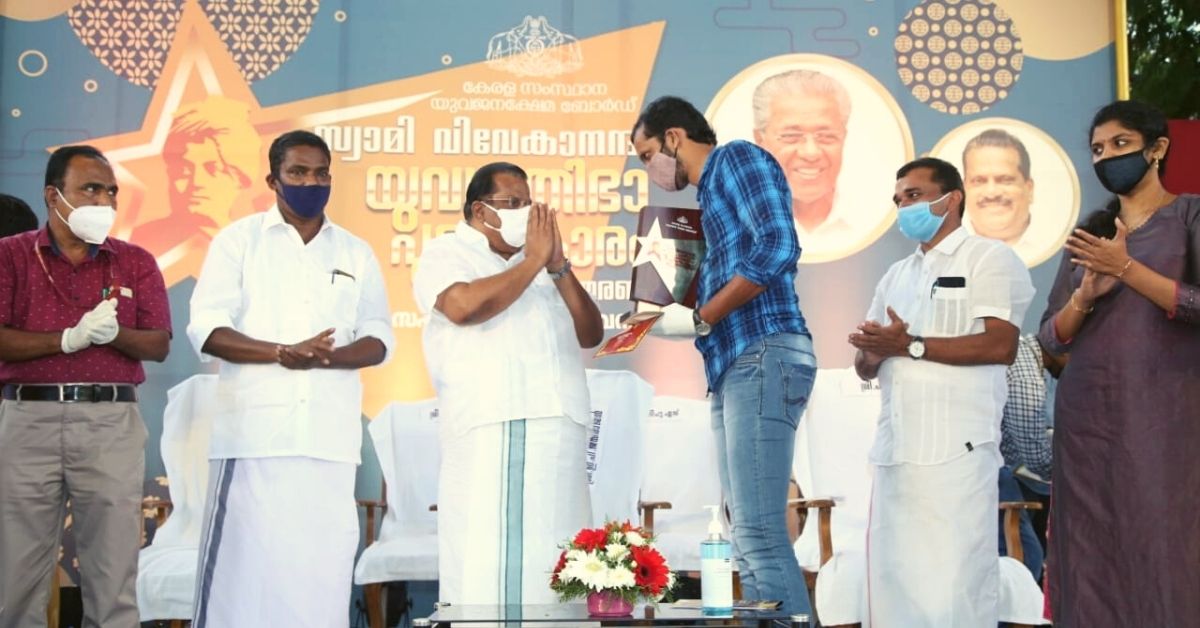“Being born in a farmer’s family is a privilege that not many realise,” says 37-year-old Tom Kiron Davis. A native of Thumbur, a small village in Thrissur district of Kerala, Tom is a proud banker-turned-farmer, who has dedicated his life to make farming a lucrative professional career, rather ‘a brand’ as he likes to call it.
Speaking about his motivation, he says, “Most of my childhood memories revolve around farming. Daily trips to the fields to help my father and grandfather helped me understand the nuances involved in the entire process both pre and post-harvest. It was an education that not many people appreciate, unfortunately.”
But, he did.
And that is why, despite having a Masters in Economics, and a successful career in the UAE, he decided to come back to his roots. In 2015, he quit his high-paying job in Dubai to return to Kerala and start farming.
“Almost everyone I knew was against this decision. People called me a fool. No one could imagine that a well-educated person would want to farm. You see, farming here is considered a low-income occupation that can only be fueled by necessity and compromise. I challenged that notion by making an informed choice to start farming and dedicating my efforts to make it a lucrative form of livelihood,” he shares.
Not only did he successfully manage to prove this point but he did so by overcoming another major challenge — turning hundreds of acres of barren land into fertile cultivation.
Fallow to Fertile

Once back home, Tom found out about hundreds of acres of land lying abandoned and barren for years in Velukkara panchayat. He immediately decided to take on the challenge of turning this land into fertile fields ready for cultivation.
He started this journey by leasing about one and a half acres of uncultivated land and initiated the cleaning process.
“Nothing was grown there for decades, so no one was even willing to touch it. People had assumed that this was a wasteland. So instead, I started preparing the land by removing weeds and dirt, levelling the ground and even cleared a 2km long canal that runs through Vazhukkilichira paddy field for irrigation. The next step was to enrich the soil organically. Rain is good in this area so water is not a problem but organically enriching the soil took time. We used natural fertilizers like cow dung, jeevamrit, ghanjivamrit and vermicompost and in just a month and a half, the 1.5 acres of land was finally ready for farming,” he says. In the first year, Tom started with paddy cultivation.
Within a year he reaped the fruits of his labour with a good paddy yield and his success soon encouraged other farmers to join him. Following this, many friends and neighbouring farmers took parts of the barren land on lease and began collective farming.
“I formed a youth forum and farmer’s collective to guide them through the entire process, from preparation to harvest,” he adds. Today, a total of 200 acres of barren land has been transformed into fertile cultivation, all thanks to Tom’s relentless efforts.
But, his work does not end there.
Managing the Menace of Middlemen

In time, Tom recognised the real problem ailing the farmers of his district — the menace of middlemen.
“One of the biggest challenges that farmers face is the post-harvest sale of their produce. Most of them do not market their produce and instead make the sale via middlemen, who end up exploiting them. I decided to find a way to put an end to it, and so began to leverage technology to solve the problem. I used social media as a platform to spread awareness about the indigenous varieties of paddy we grew organically and began to welcome orders online,” he says.
Today, with the help of a group of 15 youngsters and 25 farmers, Tom grows organic paddy in 15 acres of land that is directly sold online and the paddy that is grown on the rest of the land is supplied to state government-owned company, SupplyCo. He also grows rubber, coconut, vegetables, fruits, flowers and spices like nutmeg, turmeric and mace, on 4 acres of land.
“We grow four varieties of indigenous rice organically namely, Kuruva, Rakthashali, Mattatriveni and Kodukanni, on 15 acres of land. There is a high demand for good quality organic produce and by directly selling these online at a good price, we are empowering the farmers,” says Tom who sells spices, jackfruit, tamarind and mangoes in addition to rice on their online platform. He has also launched a brand called Pepenero for selling these products on Amazon.

Today, from just the online orders, these farmers earn annual profits worth Rs 50,000 per acre. With every farmer cultivating on at least 2 acres of land, their yearly profits touch lakhs of rupees thanks to Tom.
His continuous efforts of empowering farmers earned him the Swami Vivekananda Yuva Pratibha Award from the state government in 2018. Currently, the secretary of the Kannukettichira-Vazhukkilichira Padashekhara Samithi and a member of the Rubber Production Society in Karur, Tom has become an inspiration for many in Kerala.
As a message for the youth and fellow farmers, he adds, “We as farmers need to realise our worth. We are irreplaceable, no matter what happens in the world, a pandemic or anything else. We are our own brand.”
No comments:
Post a Comment